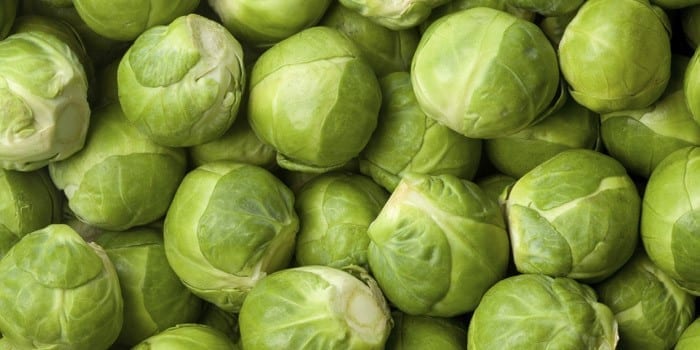Brussels sprouts may be the cilantro of vegetables — you either love them or you can’t stand them, but you have to respect a vegetable that’s so small and yet packs such a wallop in terms of nutrition. Brussels sprouts are not only rich in fiber but also protein (yep, you read that right).
Surprised? We were, too. With the help of Keri Gans, registered dietitian and author of The Small Change Diet, here are some interesting facts about this petite piece of produce:
- Brussels sprouts look like baby cabbages for a good reason: They’re a member of the cabbage family that includes veggies with edible leaves.
- Some people have a gene, known as TAS2R38, that make Brussels sprouts and other cabbages taste bitter to them.
- One cup of cooked Brussels sprouts only sets you back 56 calories.
- Brussels sprouts pack in 4 grams of protein per cup — “which is high for a veggie,” pointed out Gans.
- They’re chockfull of filling fiber, with 4 grams of fiber per 1 cup of cooked Brussels sprouts.
- They’re also good source of calcium, potassium, and vitamins C, A, and K.
- Unlike most other fruits and vegetables, Brussels sprouts don’t need to ripen before you eat them.
- When picking up Brussels sprouts at the grocery store or farmer’s market, make sure the leaves are compact — not falling off from the stem — and the veggie should be hard to the touch when you squeeze it.
- It’s time to toss Brussels sprouts if the stems are brown, the sprouts are starting to get slimy, or they smell, noted Gans.
- You can boil, steam, microwave (with some water to keep them drying out), stir-fry, roast, or bake Brussels sprouts.
- When boiling, steaming or microwaving them, carve an “X” into the stem, which will help cook the vegetable more thoroughly.
- Overcooking Brussels sprouts produces a sulfur-like smell, which is usually what turns people off from the produce.
- Brussels sprouts were a popular crop in 16th century Belgium, whose capital city is — wait for it — Brussels.
- Peak season for Brussels sprouts is late September to February.
- But you can find them all year round — “they just might not taste as delicious,” noted Gans.
READ MORE: 18 Ways to Use Green Tea As a Beauty Product




































